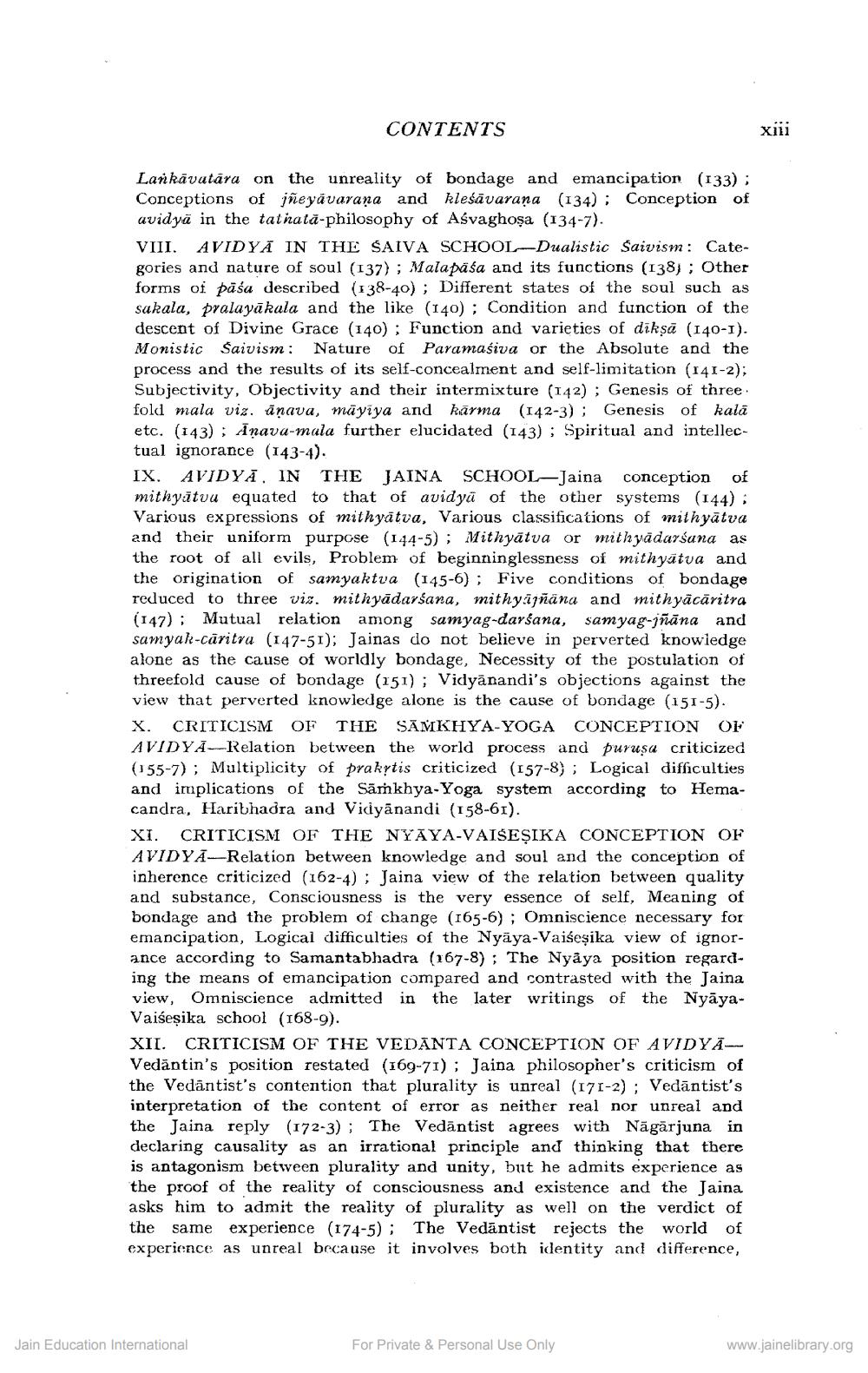________________
CONTENTS
ҳііі
Lankāvatára on the unreality of bondage and emancipation (133); Conceptions of jñeyåvarana and kleśā varana (134); Conception of avidyā in the tathată-philosophy of Aśvaghoșa (134-7). VIII. AVIDYA IN THE SAIVA SCHOOL-Dualistic Saivism: Categories and nature of soul (137) ; Malapāśa and its functions (138) ; Other forms of pāśa described (138-40); Different states of the soul such as sakala, pralayākala and the like (140); Condition and function of the descent of Divine Grace (140) : Function and varieties of dikşă (140-1). Monistic Saivism : Nature of Paramasiva or the Absolute and the process and the results of its self-concealment and self-limitation (141-2); Subjectivity, Objectivity and their intermixture (142) ; Genesis of three fold mala viz. anava, māyāya and karma (142-3); Genesis of kalā etc. (143); Anava-mala further elucidated (143) ; Spiritual and intellectual ignorance (143-4). IX. AVIDYA. IN THE JAINA SCHOOL—Jaina conception of mithyatuu equated to that of avidyā of the other systems (144) : Various expressions of mithyātva, Various classifications of mithyātva and their uniform purpose (144-5); Mithyātva or mith yādarśana as the root of all evils, Problem of beginninglessness of mithyātva and the origination of samyaktva (145-6); Five conditions of bondage reduced to three viz. mithyādarśana, mithy:ījñana and mithyācāritra (147); Mutual relation among samyag-darśana, samyag-jñāna and samyak-Caritra (147-51); Jainas do not believe in perverted knowledge alone as the cause of worldly bondage, Necessity of the postulation of threefold cause of bondage (151); Vidyānandi's objections against the view that perverted knowledge alone is the cause of bondage (151-5). X. CRITICISM OF THE SAMKHYA-YOGA CONCEPTION OF AVIDYA-Relation between the world process and puruşa criticized (155-7); Multiplicity of prakytis criticized (157-8); Logical difficulties and implications of the Samkhya-Yoga system according to Hemacandra, Haribhadra and Viciyānandi (158-61). XI. CRITICISM OF THE NYAYA-VAISEŞIKA CONCEPTION OF AVIDYA-Relation between knowledge and soul and the conception of inherence criticized (162-4); Jaina view of the relation between quality and substance, Consciousness is the very essence of self, Meaning of bondage and the problem of change (165-6); Omniscience necessary for emancipation, Logical difficulties of the Nyāya-Vaišeşika view of ignorance according to Samantabhadra (167-8); The Nyaya position regarding the means of emancipation compared and contrasted with the Jaina view, Omniscience admitted in the later writings of the NyāyaVaiseșika school (168-9). XII. CRITICISM OF THE VEDANTA CONCEPTION OF AVIDYAVedāntin's position restated (169-71); Jaina philosopher's criticism of the Vedāntist's contention that plurality is unreal (171-2); Vedāntist's interpretation of the content of error as neither real nor unreal and the Jaina reply (172-3); The Vedāntist agrees with Nāgārjuna in declaring causality as an irrational principle and thinking that there is antagonism between plurality and unity, but he admits experience as the proof of the reality of consciousness and existence and the Jaina asks him to admit the reality of plurality as well on the verdict of the same experience (174-5); The Vedāntist rejects the world of experience as unreal because it involves both identity and difference,
Jain Education International
For Private & Personal Use Only
www.jainelibrary.org




